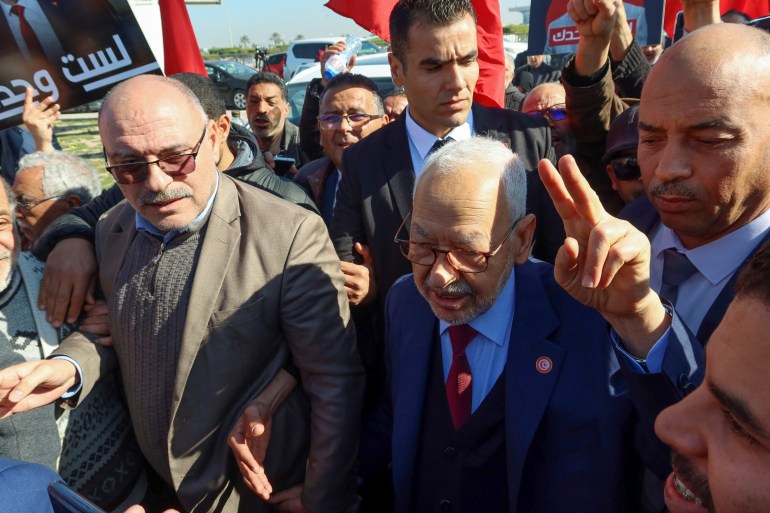ARTICLE AD
Tunisian media had little to say about the sentencing of Rachid Ghannouchi, leader of the self-styled Muslim democrats, Ennahdha, and former speaker of parliament, to an additional three years’ imprisonment, providing some indication of the extent of the president’s current authoritarian reach, analysts say.
The 82-year-old Ghannouchi was sentenced along with his son-in-law, former Foreign Minister Rafik Abdessalem, for receiving foreign funding, illegal under Tunisian law.
At the time of sentencing, Abdessalem was overseas while Ghannouchi was already in jail, having already been found guilty of “incitement” last year. Abdessalam had left Tunisia after he was convicted of having defamed the Post Office after he accused the body of having shared citizens’ savings with the government.
A fine of about $1.17m, said to be the amount of overseas donations to the party, was imposed on the party.
Significance
Ennahdha has played a critical role throughout Tunisia’s post-revolutionary history, featuring prominently in most of the country’s governments and helping define the 2014 Constitution, which remained in place until the current President Kais Saied’s revisions of 2022.
Throughout this period, Ghannouchi has played an outsize role in Tunisian politics, dominating headlines and serving as a frequent lightning rod for popular dissent.
However, little of that hold on the popular imagination was on display following his sentencing. No mention was visible on any of the country’s newsstands, with the state-owned La Presse leading on Saied’s visit to a paper factory, rather than the Ennahdha leaders’ legal difficulties.
 President Kais Saied is accused of launching a crackdown on his opponents [File: Mohamed Messara/EPA-EFE]
President Kais Saied is accused of launching a crackdown on his opponents [File: Mohamed Messara/EPA-EFE]
Saied’s influence on Tunisian media since his dramatic power grab of July 2021, labelled a coup by his opponents, has had a chilling effect on the national conversation, observers claim.
In 2021, the president had shuttered parliament and dismissed both independent Prime Minister Hichem Mechichi and Speaker Ghannouchi to a groundswell of support from a public beleaguered by years of false promises, a declining economy and soaring unemployment rates.
Among a plethora of initiatives introduced by the untethered president during this period were new laws designed to reshape the judiciary, as well as strict laws governing freedom of expression in Tunisia.
Return to authoritarianism
“It’s like everyone already knew the rules of the game,” Tunisian political author Amine Snoussi, who now lives in France, said.
“The journalists, editors and producers simply switched back to how they operated under the pre-revolutionary regime. The authoritarian machine was always there, just waiting,” he said.
“I have some fairly profound political differences with Ghannouchi, but I never felt under threat from him,” Snoussi continued.
“Some years ago, I even started a petition calling for him to be investigated for any links he may have had to two past political murders [strenuously denied by Ghannouchi]. It never occurred to me that he would, or could, target me. I can’t imagine doing the same under Kais Saied, it’s unthinkable,” he said.
Decree Law 54, introduced by Saied in September 2022 – ostensibly to restrict the sharing of false information on electronic networks – and increased readiness to launch legal actions based on the country’s existing laws, have already seen more than 20 journalists and online activists jailed or being investigated for what critics say are free speech issues.
In addition, the president’s political opponents, ranging from Ennahdah members to the party’s most vocal critic, the leader of the secular Parti destourien libre, Abir Moussi, have all found themselves imprisoned on charges denounced by rights groups as political.
Snoussi describes watching as the president dismantled any source of potential opposition to his rule. “We all thought it couldn’t happen,” he said. “We had these protests about … police violence [and] Manich Msamah,” he said of the opposition group founded to oppose former President Beji Caid Essebsi’s attempts to reconcile with members of the pre-revolutionary regime.
“Lawyers, jurists and civil society activists, all thought we wouldn’t be back here.”
While vestiges of Tunisia’s once formidable civil society groups remain, most recently finding a voice in condemnation of Israel’s war on Gaza, a theme that chimes with one of the president’s passion projects, it is unarguable that the movement is a shadow of its former self.
“It’s worth noting that civil society is today more threatened than at any time since 2011,” Salsabil Chellali, Tunisia director at Human Rights Watch, said of the muted response to Ghannouchi’s newest prison sentence.
 Rached Ghannouchi, head of Ennahdha and speaker of an elected parliament that Saied dissolved, arrives at a court for questioning in Tunis, Tunisia on February 21, 2023 [Jihed Abidellaoui/Reuters]
Rached Ghannouchi, head of Ennahdha and speaker of an elected parliament that Saied dissolved, arrives at a court for questioning in Tunis, Tunisia on February 21, 2023 [Jihed Abidellaoui/Reuters]
“In addition to being demonised by President Saied and his supporters, it is also facing increasing restrictions on its activities. The authorities’ repressive measures are undeniably contributing to a climate of fear and the gradual dismantling of the civil society dynamic,” she said.
The case
Both Ennahdha and Ghannouchi’s lawyers have released statements rejecting the accusations of receiving foreign funding, which they say relate to a separate organisation, the Ennahdha Party Diaspora Group, which is registered overseas.
According to a statement released by the party following Ghannouchi’s sentencing, Ennahdha had no overseas representation, with the party only retaining one bank account which, they said, was “under the supervision of all judicial and financial institutions and is fully transparent and flawless”.
A separate statement issued by Ghannouchi’s lawyers pointed to what they said were shortcomings in the trial and restrictions on their freedom to access evidence.
Nevertheless, despite what the party sees as the injustice of the verdict, Ennahdha has no plans to appeal it.
“Why?” Ennahdha party member and former minister of youth, Ahmed Gaaloul, said. “There’s no chance of it succeeding. There’s no chance of justice in Tunisia, no chance of a fair trial anymore.
“This was a political decision, not a judicial one. Why would Rachid Ghannouchi put either his family or the party through an appeal? None of us, including Mr Ghannouchi, are going to help Saied repeat his propaganda, which is what we would be doing.”
Further to declining to appeal the verdict, Gaaloul also confirmed that the party had no intentions of paying the $1.17m fine, an astronomical sum by Tunisian standards.
“How are we supposed to raise that?” Gaaloul asked. “We don’t have it. What’s more, since the police closed all our offices [in April of last year] we can’t call upon our members to contribute towards it.
“Even if we could, there are better places to spend that sort of money, we could put it to something that might actually benefit the country, rather than plug the shortfalls in Saied’s budget,” he said.

 1 year ago
89
1 year ago
89 
